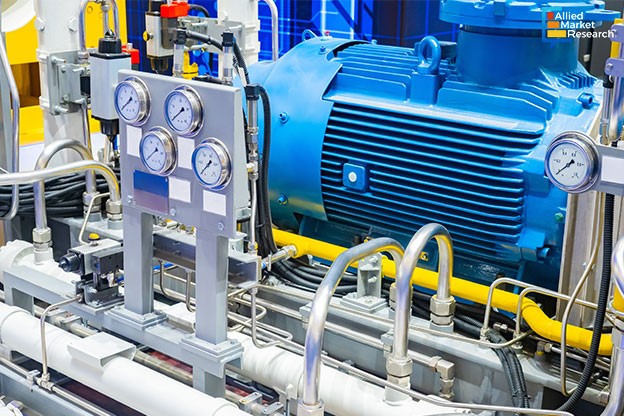Which Hydrogen Compressor Industry Trends are Profitable for Your Equipment Business?

11 Apr
2024
Highlights
- Introduction
- Trends in the hydrogen compressor
- New product launches
A hydrogen compressor decreases the volume of hydrogen gas to elevate its pressure, thereby producing either compressed hydrogen or liquid hydrogen. Positive displacement and centrifugal compressors stand out as the predominant types of compressors employed for compressing gaseous hydrogen. Among them, the mechanic hydrogen compressor demonstrates numerous advantages across various end-user industries.
The mechanical hydrogen compressor possesses a unique advantage; it operates without moving components, ensuring noiseless operations and delivering high levels of reliability & safety. Furthermore, its structural simplicity and enhanced compactness contribute to its efficiency and ease of use. Owing to such features, the mechanical compressor segment is projected to manifest absolute revenue growth of $897.0 million by 2032.
Futuristic trends in the hydrogen compressor industry
The hydrogen compressor industry has experienced dynamic transformations driven by the rapid transition toward hydrogen-based economies. Current trends highlight a rise in emphasis on technological advancements, heightened energy efficiency, and the establishment of infrastructure to meet the surge in demand for sustainable and clean hydrogen solutions. As global initiatives for greener energy alternatives gain momentum, the sector is projected for continual evolution, with a greater emphasis on regulatory adherence and the incorporation of smart monitoring abilities.
Surge in emphasis on reliability and safety
Compressors equipped with redundant safety measures, leak detection systems, and advanced materials have gained momentum due to rise in demand for safety and security. Moreover, there is rise in adoption of technologies for predictive maintenance and remote monitoring, which enable proactive diagnosis and minimize downtime, crucial for ensuring the reliability of hydrogen supply systems.
Combining hydrogen infrastructure
The expansion of hydrogen infrastructure has highlighted the vital role of high-pressure compressors in larger systems. Research indicates a rise in demand for integrated solutions that combine dispensing, storage, and compression functionalities of compressors. This trend highlights the necessity for enhanced collaboration between infrastructure developers and compressor manufacturers, potentially leading to the development of pre-engineered, modular compressor systems developed for specific use cases.
Evolving landscape of the Asia-Pacific hydrogen compressor industry
Asia-Pacific is the fastest-growing manufacturing hub for the hydrogen compressors industry, including countries such as Japan, China, India, Thailand, and South Korea. This region plays a pivotal role as a driving force behind the expansion of the sector. Furthermore, the abundance of labor and the continuous rise in industrialization contribute to the expansion of the hydrogen compressors sector in Asia-Pacific.
Moreover, the rapid pace of government initiatives and industrialization aimed at boosting the manufacturing sector, particularly in the chemical and automotive industries, are key drivers that propel the growth of the hydrogen compressors sector in Asia-Pacific. Among the Asia-Pacific countries, Thailand is expected to display the fastest CAGR of 5.8% by 2032.
Frontrunner's tactics to sustain the competitive industry
The global hydrogen compressor industry has gained popularity due to expansion of the oil & gas sector and rapid industrialization in developing countries. Top entities have adopted novel strategies to lead supremacy in the dynamic industry. For instance, in April 2024, "MITSUI E&S," officially launched the sale of high-flow hydrogen compressors specifically designed for hydrogen station facilities and hydrogen production equipment. This compressor compresses hydrogen up to 50 MPa. Notably, just one compressor is sufficient to manage the pressurization of hydrogen generated by water electrolysis unit.
On the other hand, in January 2024, Siemens Digital Industries Software announced REJOOL, a startup dedicated to hydrogen compression devices. REJOOL opted to utilize Siemens Xcelerator as a Service portfolio of industry software to assist in the commercialization of its PIONYR hydrogen compression technology. REJOOL's engineering team has chosen Siemens' NX™ software for its product engineering and simulation tasks, accompanied by Siemens' Teamcenter® X solution for cloud-based PLM (Product Lifecycle Management).
To conclude, the global hydrogen compressor industry has gained momentum due to the expansion of the oil & gas sector and rapid industrialization in developing countries. However, advanced technologies will offer remunerative growth opportunities for industry in the upcoming years.
For detailed information on investment opportunities and the competitive scenario of the hydrogen compressor industry, contact our experts today!

Koyel Ghosh
Author’s Bio- Koyel Ghosh is a blogger with a strong passion and enjoys writing in miscellaneous domains, as she believes it lets her explore a wide variety of niches. She has an innate interest in creativity and enjoys experimenting with different writing styles. A writer who never stops imagining, she has been serving the corporate industry for the last five years.
Avenue: Entire Library membership of Allied Market Research Reports at your disposal
- Avenue is an innovative subscription-based online report database.
- Avail an online access to the entire library of syndicated reports on more than 2,000 niche industries and company profiles on more than 12,000 firms across 11 domains.
- A cost-effective model tailored for entrepreneurs, investors, and students & researchers at universities.
- Request customizations, suggest new reports, and avail analyst support as per your requirements.
- Get an access to the library of reports at any time from any device and anywhere.
Related Post
-
How are Submarine Cables Transforming Global Connectivity with Enhanced User Experience?
-
Endoscopy Procedures: Transformations in Techniques and Applications
-
AI-Powered Video Analytics: How the Product Actually Works for enterprises
-
Painting Robots: Transforming Precision Coating and Creative Applications
-
Innovations in Pharmacovigilance Systems Advancing Patient Safety
-
Understanding Edge Security: Keeping Data Safe Near the Source
-
Exploring the Use and Advancements of 3D Laser Scanners in Professional Applications
-
Reinforcing Industrial Controls with Smarter Tools and Training








